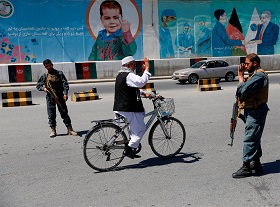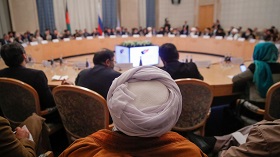The release of 400 prisoners is perceived as a good step toward peace in Afghanistan. It opens the way for the intra-Afghan talks to discuss future outlook of the Afghan political setup, agree on giving up the violence and engage in the political progress. A 3-days "Loya Jirga" or grand consultative assembly was held in Kabul on 07–09 August 2020. Some 3,200 Afghan community leaders and politicians gathered amid tight security in Kabul to advise the Government on whether the prisoners should be freed. Afghanistan is a tribal society, and it is their tradition to call elders for consultations and building consensus on important issues. It can be considered as a legislative assembly in a democratic country.
Doha peace agreement was reached at a stalemate when President Ashraf Ghani refused to release Taliban prisoners. He was afraid that the released Taliban might involve an insurgency against the Government, as many of the inmates are accused of serious offenses, with more than 150 of them on death row. The list also includes a group of 44 fighters of particular concern to the United States and other countries for their role in "high-profile" attacks. U.S. Secretary of State Mike Pompeo also played his role and pushed for the release of the detainees while recognizing the decision would be "unpopular." However, the deal signed in Doha in February this year, called for the Government to free 5,000 prisoners, and for the Taliban to free 1,000 government and military personnel in its custody as a goodwill gesture ahead of the start of negotiations.
The international community — notably the United States, European Union, China, Japan, and neighbors and regional countries — should assist in building a solid economic foundation for sustainable peace in Afghanistan. Locals should be engaged in constructive economic activities as an alternative to war or terrorism. Economic prosperity and a conducive environment will help to eradicate terrorism, extremism, and fighting among various factions.
On the political front, Russia, China, and the United States should reach an understanding to assist in Afghanistan's socio-economic development, political stability, and non-interference of any foreign powers, along with other regional states. U.N. may come forward for such a guarantee.
The release of 400 prisoners is perceived as a good step toward peace in Afghanistan. It opens the way for the intra-Afghan talks to discuss future outlook of the Afghan political setup, agree on giving up the violence and engage in the political progress. A 3-days "Loya Jirga" or grand consultative assembly was held in Kabul on 07–09 August 2020. Some 3,200 Afghan community leaders and politicians gathered amid tight security in Kabul to advise the Government on whether the prisoners should be freed. Afghanistan is a tribal society, and it is their tradition to call elders for consultations and building consensus on important issues. It can be considered as a legislative assembly in a democratic country.
Doha peace agreement was reached at a stalemate when President Ashraf Ghani refused to release Taliban prisoners. He was afraid that the released Taliban might involve an insurgency against the Government, as many of the inmates are accused of serious offenses, with more than 150 of them on death row. The list also includes a group of 44 fighters of particular concern to the United States and other countries for their role in "high-profile" attacks. U.S. Secretary of State Mike Pompeo also played his role and pushed for the release of the detainees while recognizing the decision would be "unpopular." However, the deal signed in Doha in February this year, called for the Government to free 5,000 prisoners, and for the Taliban to free 1,000 government and military personnel in its custody as a goodwill gesture ahead of the start of negotiations.
Afghanistan is in the state of war for the last 4-decades. It is the fourth generation – grand-father, father, son, and grandson are victims of war. The country is completely destroyed, the economy collapsed, no schooling, no healthcare, no industrialization, a war-torn country needed peace urgently. Due to instability, the country has become the hub of terrorism and proxies. Foreign interests in Afghanistan have resulted in more disaster to local people.
After spending almost one trillion U.S. dollars and 19 years, in the Afghan war, the U.S. has realized it is a war that the U.S. can not win. Then the decision of withdrawal of troops was made. It is believed that after the removal of U.S. troops and all other foreign interests reaches an end, it might be helpful bringing peace to Afghanistan.
It is believed that victory for peace for the Afghan people is vital for the whole region as well well as globally. The waring groups ought to find a political solution within the Afghan factions through broad-based consultations. The unity, sovereignty, and territorial integrity of Afghanistan need to be ensured and respected by the international community. Afghanistan should be free of all types of foreign interventions and interest. A complete ban on foreign proxies must be guaranteed. Let the Afghans decide their own fate on their own, without any influence from outside.
However, the international community — notably the United States, European Union, China, Japan, and neighbors and regional countries — should assist in building a solid economic foundation for sustainable peace in Afghanistan. Locals should be engaged in constructive economic activities as an alternative to war or terrorism. Economic prosperity and a conducive environment will help to eradicate terrorism, extremism, and fighting among various factions.
On the political front, Russia, China, and the United States should reach an understanding to assist in Afghanistan's socio-economic development, political stability, and non-interference of any foreign powers, along with other regional states. U.N. may come forward for such a guarantee.
However, Pakistan can assist Afghanistan by offering connectivity and participation in the China-Pakistan Economic Corridor (CPEC) projects. It is worth mentioning that we share mountains, rivers, borders, cultures, traditions, religions, and ethnicity with Afghanistan. Pakistan is the only country who understand Afghanistan well and can integrate with their customs and traditions. There exists acceptability for Pakistan among the masses of Afghanistan.
Pakistan suffered a lot due to the Afghan war. We sacrificed 80,000 precious lives, an estimated economic loss worth U.S. Dollars 250 Billion, and an additional gift of terrorism, extremism, drugs & gun culture. Pakistan will be the first country on this earth to want peace and stability in Afghanistan.
The withdrawal of U.S. troops began earlier this year, but roughly 8,600 US soldiers remain in Afghanistan, and their return will depend on the Taliban honoring its commitment to fight against other armed groups and ensure Afghanistan is not again used to attack the U.S. or its allies. Defense Secretary Mark Esper said the U.S. plans to cut its troop levels in Afghanistan to "a number less than 5,000" by the end of November.
Credit goes to Zalmay Khalilzad special peace-envoy to Afghanistan, who spent more than a year and a half negotiating the deal with the Taliban to provide for the withdrawal of American soldiers after nearly 19 years in Afghanistan. Pakistan played a vital role in bringing the Taliban to the negotiating table.






